

OASIS. *Open Access Button. *Unpaywall. ArXiv.org e-Print archive. Preprint. AI-Powered Research Tool. Shareyourpaper.org. Scholar.archive.org. CORE. *The Lens - Free & Open Patent and Scholarly Search. JURN : search millions of free academic articles, chapters and theses. Public Library Of Science. CORE Discovery. LibKey Nomad.
EBSCO Open Dissertations Project - Join the Movement. OpenCitations - Home. Home Get Full Text Research - GetFTR. Google Scholar Button. Kopernio: Access millions of research papers in one click. DiRT Directory (digital research tools) BibSonomy. #ihaspdf hashtag. Open Syllabus Project. Directory of Open Access Repositories - v2.sherpa. Universal School Library : Free Texts (Based on Controlled Digital Lending, not only OA) By Achebe, Chinua texts eye favorite 45 comment 1 [This book is] a simple story of a "strong man" whose life is dominated by fear and anger ...Uniquely ...African, at the same time it reveals [the author's] ... awareness of the human qualities common to men of all times and places. by Rowling, J.
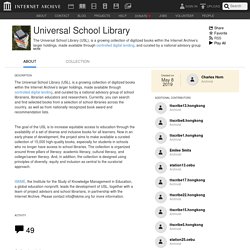
Favorite 33 comment 0. Directory of Open Access Journals. Knowledge Unlatched – Free access to scholarly content for every reader across the world (EBSCO) DOAB: Directory of Open Access Books. Sci-Hub: removing barriers in the way of science (WITHOUT REGARD TO COPYRIGHT)
Think Sci-Hub is Just Downloading PDFs? Think Again. Editor’s Note: Today’s post is by Andrew Pitts, Co-Founder and CEO of PSI, and is based on the talk he gave at the 2018 Society for Scholarly Publishing (SSP) Annual Meeting.
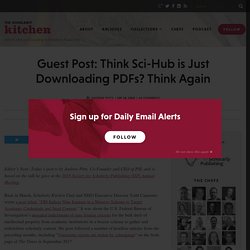
Back in March, Scholarly Kitchen Chef and NISO Executive Director Todd Carpenter wrote a post titled, “FBI Indicts Nine Iranians in a Massive Scheme to Target Academic Credentials and Steal Content.” It was about the U.S. Federal Bureau of Investigation’s unsealed indictments of nine Iranian citizens for the bulk theft of intellectual property from academic institutions in a brazen scheme to gather and redistribute scholarly content. His post followed a number of headline articles from the preceding months, including “University secrets are stolen by cybergangs” on the front page of The Times in September 2017. Why me? Let me be clear: Sci-Hub is not just stealing PDFs.
As my SSP co-panellist Joe DeMarco, IP theft and cybercrime lawyer and former federal cybercrime prosecutor in New York, said during our panel: Library Genesis. Pirate website Sci-Hub is making the world’s academic research free to all. But at what cost? Hitting a paywall is a regular occurrence for those trying to read the latest research study.
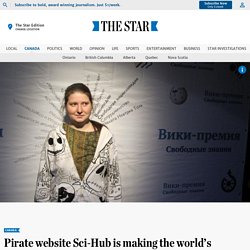
But now anyone with internet can access for free almost all the scholarly research produced in the world. That solution, however, involves using a database of pirated research papers known as Sci-Hub. It hosts more than 60 million papers with half a million downloads per day. Before Sci-Hub, you had to pay roughly $40 for each article, unless you attended a university willing to pay the millions required for bundled journal subscriptions. OpenUP Hub - Home. PubMed Labs. *CORE. Open Access Directory. Connecting Research and Researchers. Unsub. Directory of Open Access Journals. Lean Library. Lazy Scholar. BASE (Bielefeld Academic Search Engine): Basic Search. Access millions of research papers in one click. Open Data Sets by Topic - Open Data Collections - SJSU Research Guides at San José State University Library.
Free full-text scholarly articles. Get The Research: unpaywall-search-webapp. New, powerfully simple library tool to deliver articles. No subscription needed. Caselaw Access Project. Paperity - Multidisciplinary aggregator of Open Access journals & papers. Open Access - SPARC. Research provides the foundation of modern society.
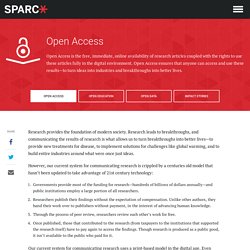
Research leads to breakthroughs, and communicating the results of research is what allows us to turn breakthroughs into better lives—to provide new treatments for disease, to implement solutions for challenges like global warming, and to build entire industries around what were once just ideas. However, our current system for communicating research is crippled by a centuries old model that hasn’t been updated to take advantage of 21st century technology: Governments provide most of the funding for research—hundreds of billions of dollars annually—and public institutions employ a large portion of all researchers.Researchers publish their findings without the expectation of compensation.
Our current system for communicating research uses a print-based model in the digital age. Open Access is the free, immediate, online availability of research articles combined with the rights to use these articles fully in the digital environment. New tools to put OA into Interlibrary Loan from the Open Access Button. Plos. ResearchGate - Share and discover research.
#ihaspdf hashtag. BibSonomy. Dataset Search. Open Data Sets by Topic - Open Data Collections - SJSU Research Guides at San José State University Library. *How Unpaywall is transforming open science. EBSCO & Open Access. More about open citations — Citation Gecko, Citation extraction from PDF & LOC-DB. Baader-Meinhof phenomenon describes a cognitive bias where learning a new word tends to make one notice the word being used more.
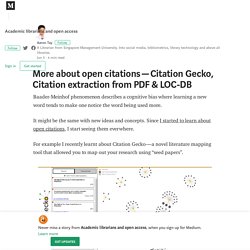
It might be the same with new ideas and concepts. Since I started to learn about open citations, I start seeing them everwhere. For example I recently learnt about Citation Gecko — a novel literature mapping tool that allowed you to map out your research using “seed papers”. The key here is that Citation Gecko was able to leverage citation links between seed papers and other papers to help highlight possible papers of interest.
For instance it could reveal papers that were cited frequently by your seed papers (co-citations) or conversely papers that cited your seed papers a lot (bibliometric coupling) among other tricks. But where is the data from? An earlier tool I was familar with called whocites did something similar but scraped the data from Google Scholar, which was very slow and led to a lot of captchas. General Overview - Open Educational Resources (OER) - Subject Guides at Binghamton University Libraries. Google Public Data Explorer.